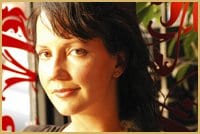The way she tells the story, Pascale Goodrich-Black’s songwriting skills aren’t always inspired. In fact, the Vancouver singer/songwriter admits, sometimes they are downright provoked.
The 35-year-old’s journey may not read like a fairy tale, but her stories — ranging from the tumultuous to the joyful — are responsible for the folk-infused music she sings each time she gets on stage.
“I’m a fighter and I’m ferocious because of the way my life has been,” Goodrich-Black reveals. “The harder you knock me down the faster I snap back.”
The singer is extremely candid about the difficult places she came from, and how she has had to climb her way up the self-esteem ladder since she was very young. Tough topics ranging from sexual abuse to homophobia to mental illness permeate the conversation and also show themselves on her new CD My Crooked Line.
An uncomfortable conversation she had with her father one night inspired the title track’s subject matter, she says.
“My parents are very homophobic people with three queer daughters. My Crooked Line came out of me just after I had a conversation with my father that got really nasty, Goodrich-Black recalls. “I got off the phone and just started writing. It is aimed at my dad, but it is also to anyone who has given me shit about [being queer].
“In society, some people still think that being gay is a sickness, a disease, a choice,” she notes.
“It was a really conscious decision having that as the title to the album. That is what it is referring to. I’ve got my own line, my own way of being a queer person of my convictions.”
Goodrich-Black admits to being deeply inspired by other musicians, both lyrically and stylistically, who bring their emotive truths to their music, citing Lucinda Williams and Joni Mitchell as huge influences. As a result, the songs on her CD involve her reflecting on – and rising above – tough memories, from her childhood to the present day. She is determined to share those experiences with hopes that others can benefit from it.
“I had a really, really rough time at a younger age and to be able to come from that, to have the confidence to stand up there on stage and take that space,
I really want people to know that. Not just because I did it, but because I want them to know that they can too,” she explains.
“In my life there have been several times when it was so dark;
I was hospitalized when I was younger … you give up, you’re done. In terms of honesty, I talk a lot about mental illness in my songs and I try and challenge people that way, to remind them that compassion is really necessary. Those things I’m very open about.”
Goodrich-Black also believes in being very open about her queerness in order to try and challenge people’s preconception on what queerdom looks, feels and sounds like. “People often think that I’m straight by the way that
I appear — as a femme,” she points out. “So I love when someone who hears a love song of mine, that makes them feel something in their heart, later finds out that a gay person wrote that. If I can get on mainstream radio, that gives me a bigger platform.
“It is so important that we challenge people’s perceptions by coming out in interviews or song lyrics,” maintains Goodrich-Black, who feels that engaging people through these media might help change minds.
“To me, the more strong bright people are changing public opinion, the more — hopefully — we can move forward,” she continues. “Kids can grow up and know that they are not sick and twisted, know that they are really ok. Hopefully that also means we do get more rights. Hopefully that means less people will be getting hanged or beaten, hopefully I don’t have to worry that in five years we won’t be legally married anymore and our child won’t be taken from us. Those are realities.”
As far as the future is concerned, Goodrich-Black is heading out on a US and Canadian tour to promote her new CD and hopes to eventually become a full-time musician. In the meantime, she works hard on her music, hard on her day job (as a teacher and counsellor of at-risk youth) and focuses on gratitude each and every day.
“I’m quite spiritual so every day I do my prayers and I’m thankful for my blessings, thankful that I’m alive and have wonderful people around me,” she says.
“I’m aware that it is a miracle that I’m alive, that I made it through, that other people have shone a light for me. Every day
I have a responsibility to pay back. The people who love me tell me, ‘You’re not a superhero, you’re not here to save the world.’
“But the reality is that every single night, in my dreams, I’ve got a cape and I’m out saving the world.”

 Why you can trust Xtra
Why you can trust Xtra


